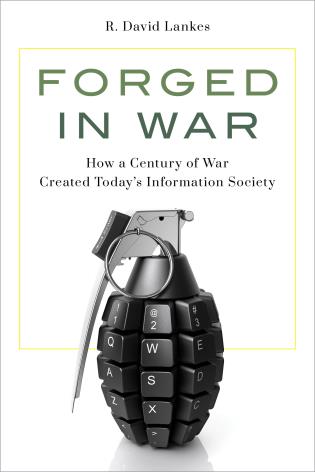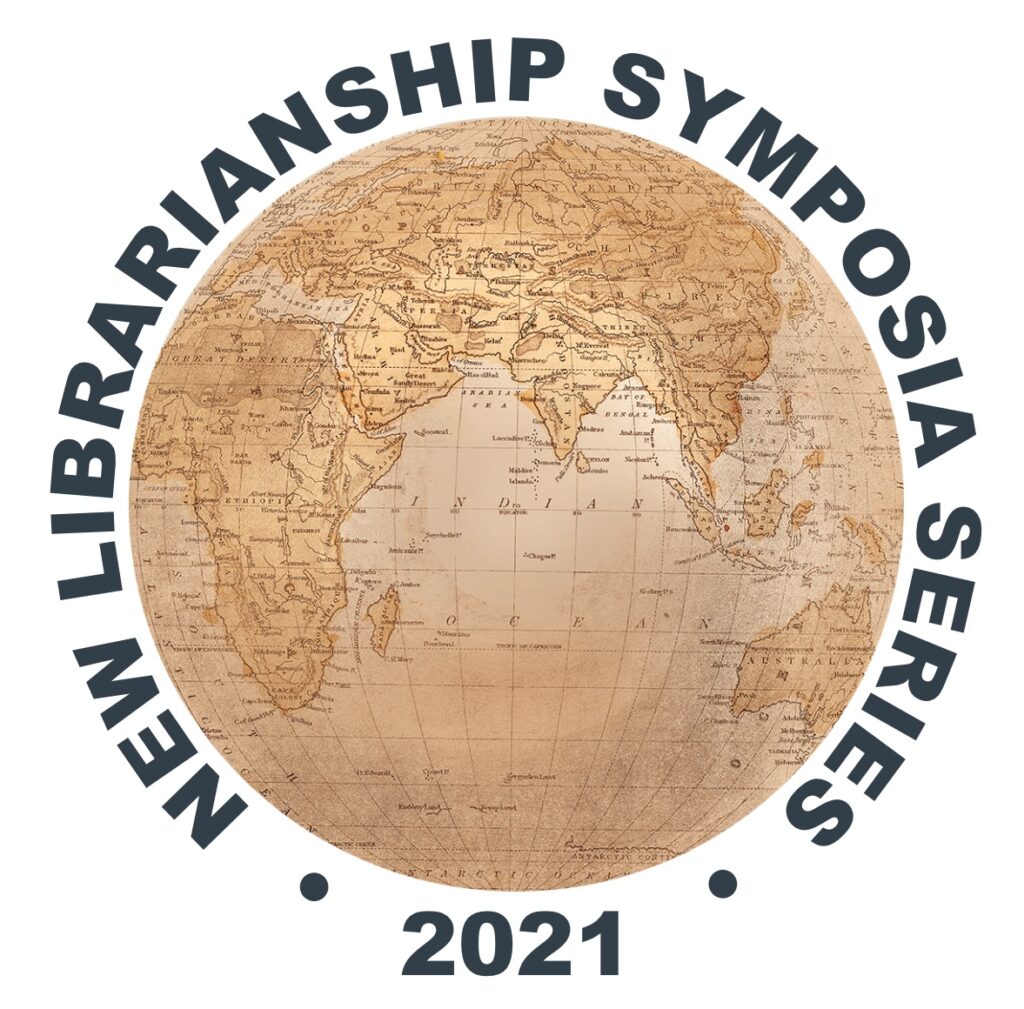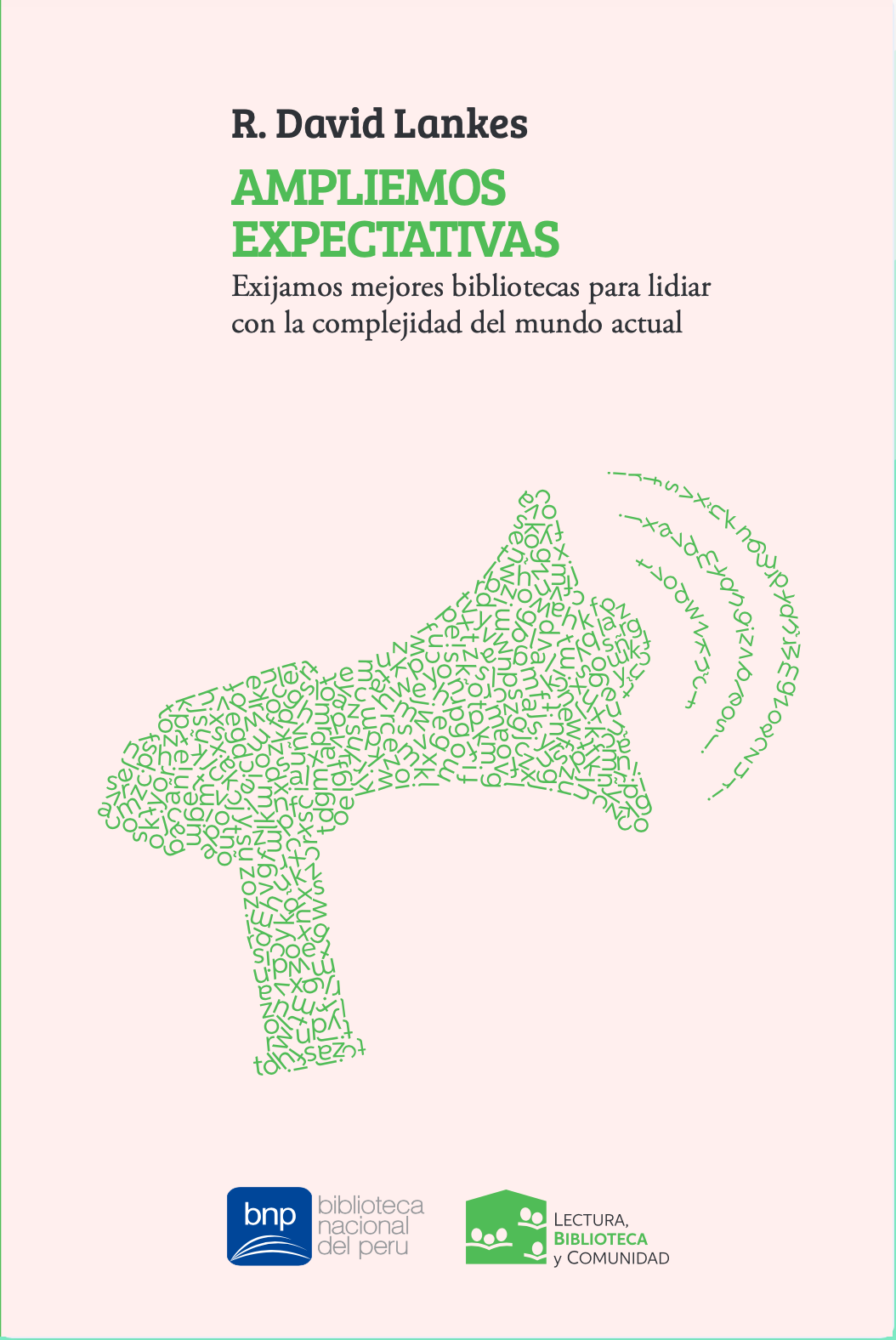Lankes, R. David (2022). The Future of Korean Libraries. World Library. Registration date: 2022-11-18. Available: bit.ly/3v3uKFc and bit.ly/3HM2JJQ
U.S. Book Show Interview
I did an interview with Andrew Albanese on current topics in the library field, and my book, Forged in War.
Libraries Lead in the New Normal Listener’s Guide
For those of you who don’t know, I’m part of a regular podcast on libraries and society in and (hopefully) post COVID. It’ a great time with my partners Beth Patin, and Mike Eisenberg. A great graduate assistant at Syracuse, Jeanne Kambara, put together a listeners guide to all the episodes so far. So, first a blurb on the podcast, and then the guide below. Check out the podcast home here: https://www.acechicagoevents.com/libraries-lead
Continue reading “Libraries Lead in the New Normal Listener’s Guide”Libraries Lead the New Normal is a provocative podcast hosted by Beth Patin (Assistant Professor, School of Information Studies, Syracuse U), Dave Lankes (Professor, iSchool, U of Texas), and Mike Eisenberg (Dean/Professor Emeritus, iSchool, U of Washington) &
There’s an emerging new normal. 2020 was brutal and has affected all aspects of our lives. As we come out of the pandemic in 2021 and beyond, we must ask, “Are these changes temporary and short-lived or are more fundamental and long-term?” It seems like this is a good time for re-examination and possibly reset of home-life and work-life, education, commerce, social life, politics, and even recreation. We think that this can be a valuable time for life-altering, ground breaking, and transformative change.
Interview about Forged in War on Circulating Ideas

Had a great conversation with Steve Thomas on his Circulating Ideas podcast on my new book Forged in War. Check it out: https://circulatingideas.com/2021/06/15/201-david-lankes-forged-in-war/
New Librarianship Symposia Invitation
I am so happy to announce a symposia series on New Librarianship.
Ten years ago MIT Press published The Atlas of New Librarianship. We are taking the opportunity of its 10th anniversary to explore some of the key issues in librarianship that have evolved and emerged since 2011 in a series of online symposia in October and November 2021. We would like to invite you to be a part.
The symposia series is sponsored by MIT Press, the University of South Carolina, the International Federation of Library Associations and Institutions, the British Library, KB National Library of the Netherlands, the U.S. Institute of Museum and Library Services, Gigabit Libraries Network, URFIST de Bordeaux, Enssib, and the Black Caucus of the American Library Association. We also expect more international organizations to join as sponsors shortly.
Call for Contributions
We seek abstract and creative format proposal submissions for ideas and approaches that can guide the field over the next decade and address the following areas:
- Equity, diversity, and inclusion
- Post-neutrality librarianship
- International influences
- A “new normal” agenda in a COVID-affected world
Symposia sessions will be streamed live, free of charge, and with efforts made to meet accessibility needs. Detailed descriptions for each topical area are below.
Accepted abstracts will be presented during a symposium and published on the University of South Carolina ScholarOne digital platform. Three abstracts for each symposium will be invited for development into white papers and awarded $2500 stipends. In addition, selected presentations will be developed into commissioned essays to be included in the Atlas of New Librarianship. Submissions from library practitioners and early career faculty are highly encouraged.
Each symposium will focus on concepts that guide library practice and development, rather than focusing on skills or specific functions tied to a given institution. Participants will be encouraged to seek broad concepts and theory that ultimately determine how librarianship is defined in and outside of the context of a library, as well as beyond sectors (public, academic, school, etc.). These symposia seek the ideas that will guide the field over the next decade instead of the latest trends or services.
Abstract submissions should address one of the four following core topics:
Symposium 1: Equity, Diversity, and Inclusion: The vital need for diversity in librarianship stems from twin beliefs in the inherent value and dignity of all people and in the fact that the best knowledge is derived from the richest variety of sources. How can this be expressed as a core value of librarianship and what are its implications for the institutions librarians build and maintain? How can we address institutional racism, biases, discrimination, and inaccessibility in library institutions, education, and practice internationally? How might we integrate principles of inclusion and universal design?
Symposium 2: Post-Neutrality Librarianship: Librarians cannot be unbiased neutral information professionals and passionate advocates for better communities. To seek an improved society calls for a vision of what “improved” means. How can librarians reconcile the reality of making service decisions in a context of limited resources with a mandate to serve the whole community?
Symposium 3: International Influences: Concepts of diversity, of service, and of librarianship itself are strongly influenced by local contexts. The idea that the work of librarians looks the same in Kenya, Norway, China, and the United States is founded on the strained concept that universal structures serve all. What in librarianship transcends national boundaries, what varies, and what is the process that connects the two?
Symposium 4: A New Normal Agenda in a COVID-Affected World: The COVID pandemic has put in sharp contrast the role of libraries in communities, and made clear how what was once considered normal, must never be normalized again. Librarians must fight for universal broadband, better workforce development, and expand democratic conversations, to ensure the wellbeing of communities and understand their roles in a crisis. What does the new normal agenda for librarianship look like?
Paper Abstract Submissions:
Abstracts for papers to be presented during a symposium should discuss, analyze, and critique critical ideas, theories, and concepts addressed within the chosen symposium topic. Submissions will be evaluated on quality of content; theoretical, conceptual, or practical significance; relevance for practice; originality; and clarity. The maximum length for an abstract, including references, is 500 words. Appendices should not be included. No author names should be listed in the abstract submitted for review.
Creative Format Contribution Proposals:
In addition to the call for paper abstracts, we invite multimedia contributions in visual, audio, audiovisual, or hybrid formats. Contributions should include a sample of work and a contributor statement and engage with critical ideas, theories, and concepts addressed within the chosen symposium topic. Submissions will be evaluated for quality of content; theoretical, conceptual, or practical significance; relevance for practice; and creativity.
Editorial Board Review: Submissions will be refereed by an editorial board assigned to each symposium area. Please see the “About” page for Editorial Board Member information.
Important Dates
- June 30, 2021: Abstract submissions due by 11:59 PM EST
- August 1, 2021: Notification of abstract and creative format proposal acceptance; notification of abstracts selected for white paper commissions
- October 28, 2021: Equity, Diversity, and Inclusion Symposium
- November 4, 2021: Post-Neutrality Librarianship Symposium
- November 11, 2021: International Influences Symposium
- November 18, 2021: A New Normal Agenda in a COVID-Affected World Symposium
- February 28, 2022: Publication submissions due by 11:59 PM EST (GMT -5)
- July 2022: Processing of materials, copyediting of submissions, and preparation of introductory materials, including audio introductions of selected content, will be completed and published on the University of South Carolina ScholarOne site.
- End of 2022 (approximate): Target publication date for The Atlas of New Librarianship,Second Edition
Click here for more information and to submit your abstract: https://scholarcommons.sc.edu/newlibrarianshipsymposia/cfp.html
Forged in War Audiobook Now Available
If you were waiting for an audio version of my new book, you’re in luck. Now available on Audible and Audiobooks.com. Read by Tom Perkins and published by Tantor Media. Unabridged, run time 9:44.
Forged in War: How a century of war created today’s information society
Lankes, R. David (2021). Forged in War: How a century of war created today’s information society. New York, NY: Rowman & Littlefield.
Forged in War: How a Century of War Created Today’s Information Society
I am proud to announce my new book Forged in War: How a Century of War Created Today’s Information Society published by Rowman & Littlefield.

Many of what we think of as Information Age tools and media— computers, cell phones, the internet, encryption, and more— evolved directly out of modern warfare. These tools started with World War I (which began not with arms but with England cutting off underwater cables to Germany to isolate it), accelerated through World War II and the Cold War, and now play a central role in both declared and non-declared conflicts like election interference and cyberbattles.
We buy phones, smart speakers, and virtual assistants like Siri and Alexa to help us do our work and answer that one trivia question that bugs us. Yet these devices are data gatherers. They collect, repackage, and monetize our questions, purchases, photographs, and web surfing to form a data industry now larger than the oil industry.
Forged in War takes a critical look at the systems we use and how we ended up in a society that increasingly values data over personal liberty and commerce over the public good. It tells a compelling and previously untold story of how our ideas of information and knowledge reflect the century of war that has militarized our worldview.
R. David Lankes’s work has been funded by organizations such as the MacArthur Foundation, the Institute for Library and Museum Services, NASA, the U.S. Department of Education, the U.S. Department of Defense, the National Science Foundation, and the U.S. State Department. This, his latest book, will help all of us learn how war has shaped our world and how to begin to create an agenda to stand down weaponized data and a media that seeks to own our personal, even intimate, data like one owns a gold mine.
Check out the star review in LibraryJournal: “VERDICT This most recent book by Lankes is ideal for readers seeking a more comprehensive look at information dissemination technology, its context, and its impact on the way in which we now live.“
Available to order from Rowman & Littlefield
SPECIAL OFFER
30% DISCOUNT OFF LIST PRICE USING CODE RLFANDF30
978-1-5381-4895-2 • Cloth May 2021 • $36.00 • after discount: $25.20
978-1-5381-4896-9 • eBook May 2021 • $34.00 • after discount: $23.80
Ampliemos expectativas – Expect More in Spanish Free Online
On Tuesday I had the honor of joining a launch event with the National Library of Peru. The library, working with the Library of Valencia, have translated Expect more into Spanish. It is a part of the National Library of Peru’s Reading, Library and Community Book seriesBest yet, they have released it to the world!
You can link to the Spanish eBook here: https://bpdigital.bnp.gob.pe/info/ampliemos-expectativas-exijamos-mejores-bibliotecas-para-lidiar-con-la-complejidad-del-mundo-actual-00638600
Here are my remarks for the release:
I am so happy to join you today for the launch of Expect more as part of the “Reading, Library and Community” Book series. I want to thank the National Library of Peru and the librarians of Valencia for their work translating and publishing the Spanish language version.
Continue reading “Ampliemos expectativas – Expect More in Spanish Free Online”Bibliotecários construindo o novo normal
Lankes, R. David (2021). Bibliotecários construindo o novo normal. Revista Brasileira de Biblioteconomia e Documentação Vol. 17



